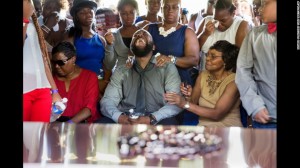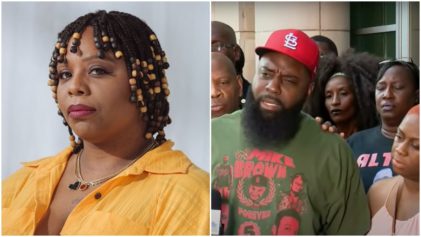Every 10 days or so since his son was shot and killed on Aug. 9 in the streets of Ferguson, Mo., Michael Brown Sr. receives a phone call from Tracy Martin, father of Trayvon Martin. Only someone like Martin, who lost his son under violent, controversial circumstances, can relate to the severe pain and sense of emptiness that comes with such loss.
Martin contacts Brown Sr. because he struggled through the immense suffering when George Zimmerman shot and killed Trayvon Martin in a tragedy that captured the nation. Michael Brown Jr.’s death at the hands of Ferguson police officer Darren Wilson has gripped the country, too. The grand jury’s decision to not indict Wilson and the subsequent protests have been at the forefront of the case.
But while those elements of the tragedy are the subjects of widespread discussion, Martin understands that Brown Sr. needs someone who has been there to assuage some of the vast emotions that envelop him now.
According to the Justice Department guide, “Coping After Tragedy,” the range of reactions after a homicide extend from shock, numbness, denial, intense emotion, fear, guilt, anger and resentment, depression and loneliness, isolation, physical symptoms of distress, panic and an inability to resume normal activity.
In the cases of Jordan Davis, Trayvon Martin and Michael Brown Jr., the parents put their efforts and emotions into publicly battling for their sons and raising awareness about their cases. In effect, they were dealing with their grief through protests and fighting for social justice.
Ron Davis, Jordan’s father, holds on to a watch that used to belong to his son. Jordan never figured out how to change the alarm so it goes off everyday at 4:40 p.m., and it reminds Ron of his son, he told First Coast News.
Davis and Lucy McBath, Jordan’s mother, said they felt like different people after Michael Dunn, the man who shot and killed their son, was convicted of murder, according to news4jax.com. Davis’ parents said it was difficult watching their son’s killer stand trial. They repeatedly saw crime scene photos and heard testimonies of the night their son died.
Both are active with organizations like the Jordan Davis Foundation and Moms Demand Action in order to educate the community.
Trayvon’s mother Sybrina Fulton told CNN that she sat through every day of the Zimmerman trial because her son “was not here to say anything for himself.” But when it was time for the jury to read the verdict, neither she nor Trayvon’s father, Tracy Martin, chose to be in the courtroom because they felt they wouldn’t be able to control their emotions. They broke down when they heard the verdict.
In an interview with ABC News five days after the not-guilty verdict, Fulton said her first reaction to hearing the verdict was shock and disbelief. In the same interview, Tracy said that as a parent, “I’ll never grasp [how the jury reached their verdict].”
Constance Malcolm, the mother of Ramarley Graham, has gone through the emotional ringer after her son was shot in the chest by police two years ago when they stormed into his house without a warrant. When the system failed her and her son, her hopes for an indictment in Brown’s case had dwindled, according to The Huffington Post. The indictment against the officer that killed her son was thrown out in 2013 and a second grand jury chose not to indict the officer. Malcolm is still waiting for justice as the Department of Justice investigates the case for a possible civil rights violation.
When asked what she would tell the Brown family, Malcolm told the Post she’d say, “It’s gonna be hard.”
Michael Brown’s parents, Michael Brown Sr. and Lesley McSpadden, had campaigned for months to gain support in getting justice for their son, going through emotional interviews on national TV and making several other public appearances.
In the first interview on CNN after their son’s death, McSpadden was choked up as she described her first born son to Don Lemon. In her hand, she kept a tissue to wipe away her tears while she was on TV. But when Lemon tried to relate to her with an anecdote about his mother telling him that parents shouldn’t die before their children, McSpadden could no longer hold back and she began to cry. Brown’s father was so distraught, he could hardly look at the camera through the interview.
“It’s hard,” he said as McSpadden attempted to control her crying. “He was my best friend, too.”
In the interview he tried to focus on remembering the good times he had with his son.
Tracy and Sybrina came to Brown’s funeral in support of Brown Sr. and McSpadden.
Brown Jr.’s parents even traveled to testify in front of the U.N. Committee Against Torture in Geneva to request international help. After the grand jury decision, they said they were “profoundly disappointed.” McSpadden grief was clear in the video that was released showing her breaking down in from of protesters when the county prosecutor read the grand jury verdict. McSpadden husband, Louis Head, reacted to the decision with anger, stomping angrily and repeatedly shouting, “Burn this bitch down!”
“There is no timetable for grieving and everyone will manage the loss of a loved one differently,” according to a statement by The National Center for Victims of Crime. “Loss forces survivors to readjust their lives in order to compensate and cope. Grief can be a long, painful process, but can be managed with assistance from friends, family members, or outside support.”



